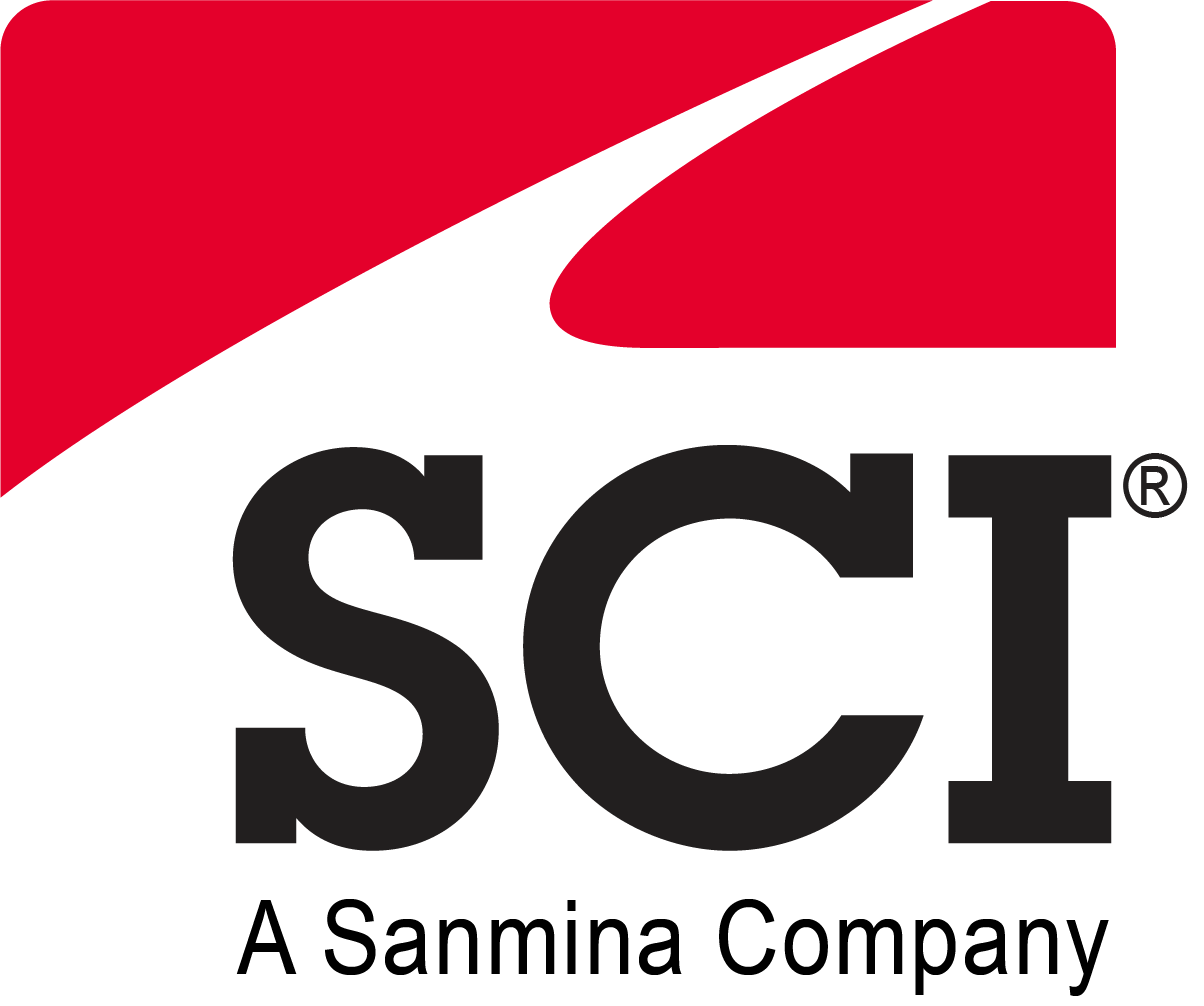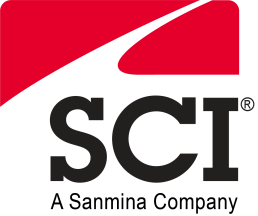Engineers
Engineering the Future
It starts with 'Why?'
Whether the mission is on land, in the air, at sea, or in space, system failure is never an option.
That’s why our engineers always go the extra mile to deliver world-class solutions for complete mission success. Every job. Every time.
Because at SCI, our mission is simple: We Serve Those Who Serve.
- Want to join our engineering team? Browse our job openings here.
- Interested in SCI’s co-op program? Learn more here.
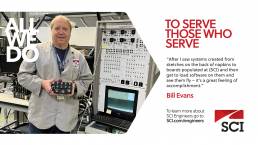
Bill Evans
College: Auburn University
Years at SCI: 32
Why did you go into engineering?
I read too much science fiction, and I am actually a third-generation engineer. My grandfather was a train engineer for 40 years or so. My dad was civil engineer in the Air Force for almost 30 years, so engineering is in my blood.
What was your first engineering project?
Worked on Single Multiplexer Unit for the Black Hawk and the VCU for the Space Shuttle as my first two projects at SCI, which were pretty fantastic places to start.
What is/was your favorite engineering project (past or present)?
Probably V22. We are working on our 4th generation system for it. I have been part of the team for all the previous versions, though it’s likely this is the last time I will get to redesign it. I probably will be retired by the time it happens next time.
What is your job title and function at SCI?
Principal Software Engineer. I am the PSM and TPM for V22, C130J and C27J aircraft and assist on projects for a bunch of other aircraft as time is available. I’m also the mentor for all the software section’s co-op students.
How does your job relate to your passion for engineering?
When my vision got too bad for me to fly for the Air Force as a child I decided I would work on airplanes instead, so getting to see my systems fly in the world’s aircraft is still pretty cool to me.
Why did you choose to work for SCI?
I knew SCI worked on Voyager and the Saturn V when I interviewed, so thought it would be an interesting place to work. After I saw systems created from sketches on the back of napkins to boards populated at what we then called Plant 13 and then get to load software on them and see them fly, it’s a great feeling of accomplishment.
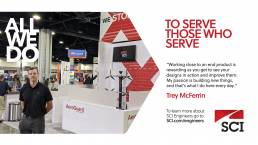
Trey McFerrin
Design Engineer
College: University of Alabama in Huntsville (UAH)
Years at SCI: 5
Why did you go into engineering?
I always had a knack for digging into the guts of how things work. I was the kid who took everything apart and had my own took kit and spare parts bin by age 10. I knew I wanted to be a design engineer because it combines tinkering with more thorough analysis and math to understand how things really work.
What was your first engineering project?
In college, I was part of the Space Hardware Club at the University of Alabama in Huntsville. We were a group of students that spent our nights and weekends building flight hardware. My freshman year, I was part of an engineering competition team building a mock satellite called CanSat. I learned to design circuit boards and embedded systems with no prior experience. Even though our system turned out a bit shaky in the end, my team and I learned a LOT to help us hit the ground running the next year.
Do you recall any particularly memorable or unusual event in your career? If so, please share a few details.
I did a variety of high-power rocketry projects in college. One particularly memorable moment involved test flying a prototype for entry into the NASA University Student Launch Initiative. Before the flight, my team and I were a bit concerned we had unnecessarily overbuilt the rocket. In flight, the rocket motor failed catastrophically due to an internal defect, resulting in a fiery crash and free-fall of the wreckage from a few thousand feet. When the dust settled, we realized that the hardest part of the rocket to re-build was actually completely intact and ready to fly again. It was a reminder that for some applications, extra durability is a huge plus if you can design it in without sacrificing other objectives.
Any special engineering awards or certifications we should know about?
I was honored to be recognized as the undergraduate aerospace engineering student of the year in 2016 at UAH!
What is/was your favorite engineering project (past or present)?
I would have to say AeroGuard, the project I’m currently working on at SCI. It’s a favorite largely because of the team I’ve worked with here; they’re a fun, cohesive, and very talented group. I’ve had what I view as a unique opportunity right out of school to help take a project from the drawing-on-whiteboard phase to an end-product. AeroGuard defends against drone attacks, so it’s also super rewarding to work on a project that protects people!
Anything else you would like to share about your career?
A career can be what you want to make of it! To those still in school, I’d definitely recommend checking out student teams on campus doing extracurricular projects that you’re interested in. Get started early, and you’ll build experience you can use to help propel you into exciting work when you graduate.
What is your job title and function at SCI?
I primarily do flight dynamics and controls engineering for in-house drone projects here at SCI. It involves cycles of flight computer algorithm design, flight testing, analysis of flight test data to understand what did and didn’t go right with the design, and then repeat. My other interest is electronics design, and I’ve supported various projects along the way as an electrical engineer too. My official title is Systems Design Engineer, but that’s only because as an Aerospace Engineer, I don’t quite fit into the traditional disciplines of Mechanical, Electrical, and Software Engineering that form the core of SCI’s engineering team.
How does your job relate to your passion for engineering?
I like solving challenging design problems, and I also like to be hands-on in testing those designs on real hardware. Working close to an end product is rewarding as you get to see your designs in action and improve them. My passion is building new things, and that’s what I do here every day!
Why did you choose to work for SCI?
The product design group I’m part of at SCI develops products on small and fast-moving teams, and isn’t afraid to try new things and fail. It struck me as a challenging and exciting environment to work in, and I haven’t been disappointed.
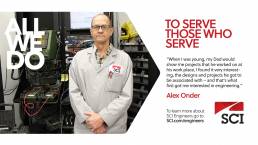
Alex Onder
Job Title: Software Configuration Management
College: UAH
Years at SCI: 26
Why did you go into engineering?
I came from a family with a strong engineering background. When I was young my Dad would show me projects that he worked on at his work place and he being an engineer I found it very interesting the designs and projects he got to be associated with and that’s what first got me interested in engineering.
What was your first engineering project?
When I started working in the Defense and Aerospace division I was assigned to work on the TOCNET project and that’s where I got to apply and learn Software Configuration Management.
Can you recall any particularly memorable or unusual event in your career?
Being part of a SCI Disaster recovery team recreation was very memorable. A team of five of us had a 24-hour task of recovering our top servers and connecting clients’ PCs to our databases for proof that the exercise was successful.
What is your job title and function at SCI?
SCM Software Configuration Management Engineer. In software engineering, software configuration management (SCM or S/W CM) is the task of tracking and controlling changes in the software, part of the larger cross-disciplinary field of configuration management. SCM practices include revision control and the establishment of baselines. If something goes wrong, SCM can determine what was changed and who changed it. If a configuration is working well, SCM can determine how to replicate it across many hosts.
How does your job relate to your passion for engineering?
Always getting to experiment with new and exciting projects.
Why did you choose to work for SCI?
I wanted to work for a company that had growth potential and SCI was that company.
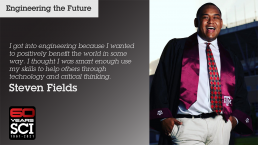
Steven Fields
Test Engineer
Years at SCI: 6 months
College: Texas A&M University
Why did you go into engineering?
I got into engineering because I wanted to positively benefit the world in some way. I thought I was smart enough use my skills to help others through technology and critical thinking.
What was your first engineering project?
My first actual engineering project was creating an autonomous marble sorter using LabVIEW when I was a freshman in college. Very challenging team project!
What is/was your favorite project (past or present)?
My favorite project was creating a smart home system with a main hub. It was made to work with paraplegics and connected to their wheel chair. Even though it didn’t work it gave me great insight on engineering design and project management. It was one of my best learning moments in college.
What is your job at SCI?
I am a Test Engineer working on multiple projects. I sustain test stations and improve test flow for the manufacturing process.
How does your current job relate to your interest in engineering?
My major, Electrical Systems Engineering Technology, goes hand in hand with Test Engineering. Being able to improve old test processes and creatively think to come up solutions is what keeps my interest in engineering. I enjoy it even though some days can be tough!
Why did you choose SCI?
I chose SCI so I could get experience in the Defense and Aerospace sector. Also to learn more about electrical engineering in the industry. Most of all I wanted to be able to make sure our troops were getting great products that worked to full functionality and could be trusted!
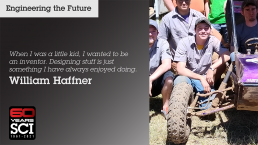
William Haffner
Mechanical Design Engineer
Years at SCI: Under 1 year (full-time, previously in the SCI co-op program)
College: Tennessee Technological University
Why did you go into engineering?
When I was a little kid I wanted to be an inventor. Designing stuff is just something I have always enjoyed doing.
What was your first engineering project?
When I was five or six I saw a video about setting steel wool on fire using electricity, so I got some hot glue, popsicle stick, a clothespin, firecracker, wire and a 9-volt battery, and cobbled together what I called a reusable hand grenade. If you put two clothespins together, jaw to jaw, and throw them, they will snap apart. When the clothespin on the “grenade” shut, it would close a circuit through the steel wool which would then start to burn and ignite the firecracker. It worked fine for lighting firecrackers but it was a lot of trouble to make for a six-year-old, so I never got up the nerve to actually throw it. I was too afraid it would break.
What is/was your favorite project (past or present)?
Working on the net launcher for AeroGuard is probably the most fun project I have ever gotten to work on.
I designed the rear suspension for the 2017 TTU Baja SAE car and it was terrible. I was a sophomore with no real guidance and didn’t understand some very basic vehicle dynamics. Stupid car couldn’t turn! But I learned a little more about roll-centers etc. and did some testing. Then I designed the rear suspension for the 2018 car and the thing turned on a dime. It was good feeling to watch our car go through the maneuverability course taking turns that the year before we would have just plowed through.
Anything else you would like to share about your career?
When I was interning at another company I got to design the jaw mechanism for Oscar the Grouch for Sesame Street Live.
How does your current job relate to your interest in engineering?
Very well. I get to design some cool stuff here and there like the drone dock and the net launcher.
Why did you choose SCI?
Honest answer? I wanted to work on AeroGuard. Better answer? I knew and liked the people from being a co-op student here and liked working for the technology segment.
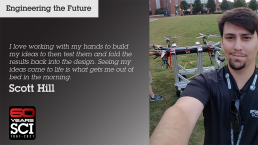
Scott Hill
Mechanical Design Engr. & Sr. Supervisor
Years at SCI: 4
College: Tennessee Technological University
Why did you go into engineering?
I decided to go into engineering when I was about 7 years old. I would take things apart around the house to figure out how they worked. My dad owned his own engineering forensics company with the purpose of acting as a professional investigator for insurance claims involving mechanical, electrical, and structural failures of products. During my summer vacations, I would shadow him on the job while he investigated failures in cars, washing machines, AC units, plumbing, and many other devices. I had the privilege of learning how these devices functioned in order to learn how they failed. This sparked a life-long interest in understanding how things work and using that knowledge to create new and useful things.
What was your first engineering project?
Aside from a lot of tinkering and cannibalizing toys to build new “inventions” when I was a kid, my first real engineering project was working on an autonomous ground vehicle for the 21st Annual Intelligent Ground Vehicle Competition during my freshman year of college. This competition involved building a robot that could successfully navigate through an obstacle course of traffic barrels and lines painted on the ground, without human interaction, to reach GPS waypoints. This experience was my first ever working on an interdisciplinary team, and I learned a ton while working with people of different backgrounds and viewpoints.
Do you recall any particularly memorable or unusual event in your career?
After graduating with my bachelor’s degree in mechanical engineering, I was fully set on pursuing a career in academia by going to graduate school, earning my doctorate, and becoming a professor. While working on my master’s degree, I had the privilege of teaching a senior-level elective on design for additive manufacturing, a.k.a. 3D printing. This experience made me realize how much I wanted to be out in the industry using what I had learned, rather than teaching it. Today, I am extremely fortunate to be doing both by designing new products and mentoring university students through our co-op program.
What is/was your favorite project (past or present)?
My favorite project has been building the iMakerSpace at Tennessee Tech University. In 2015, I was handed the keys to a newly renovated, empty section of the library and asked to turn it into a collaboration space for student innovation and entrepreneurship. With backing by both the College of Business and the College of Engineering, I filled the space with the tools students would need to prototype their ideas, and I put a system in place for them to get trained on the tools and teach others. I am very proud to see the space flourishing today.
What is your job at SCI?
My job at SCI is to design, build, and test new products, as well as continue to develop and maintain SCI’s current products. Additionally, I manage the Technology Segment machine shop, and I run our Co-op Program.
How does your current job relate to your interest in engineering?
It is an absolute dream to have a job that overlaps so well with my interests in drones, fabrication, and electronics. I love working with my hands to build my ideas to then test them and fold the results back into the design. Seeing my ideas come to life is what gets me out of bed in the morning.
Why did you choose SCI?
I chose SCI Technology because of the fast-paced, startup culture of the New Technology Segment and the AeroGuard program.
Engineering awards & certifications:
- Awarded the “Robert and Virgie Clouse Creativity and Innovation Award” at the 2017 Eagle Works Startup Competition for using 3D scanning and topology mapping to create custom 3D printed eyewear
- Awarded title of “Mr. Engineer” by the Tennessee Tech University College of Engineering in 2015 as voted on by my peers
- Awarded “Most Innovative Design” at the iAM3D Challenge Global Competition held at the 2015 American Society of Mechanical Engineers AM3D Conference and Expo held in Boston, MA for the design of a solid-state, additively manufactured anthropomorphic robotic hand
- Awarded the “Rising Renaissance Engineer Spectrum Award” by Tennessee Tech University in 2014
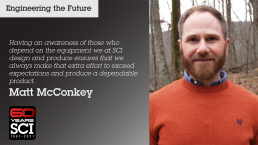
Matt McConkey
Electronic Design Staff Engineer
Years at SCI: 20
College: Tennessee Technological University
Why did you go into engineering?
From a young age I had an interest in how things worked; often taking things apart, sometimes putting them back together, sometimes correctly. I wanted to be able to create these devices and mechanisms myself. A career in engineering seemed like one that would enable me to achieve those desires and actually enjoy earning a living. It has proven to be that.
What was your first engineering project?
Professionally my first engineering project would be my work on the Electronic Voice Message Unit (EVMU) at SCI. Being my first career project as a fresh graduate of Tennessee Tech University, and having been given the responsibility of designing the circuit card responsible for the audio function of the unit, I was understandably a bit nervous. Fortunately both Randy Fadorsen and Ken Eichman were there to mentor me and guide me through the process and the project was a success.
Do you recall any particularly memorable or unusual event in your career?
Having spent a couple of years of my career at SCI working on the V-22 Intercommunication System program, it was a special event to me when I was able to witness the flight and landing of the V-22 Osprey tilt-rotor aircraft in downtown Huntsville shortly after completion of my efforts on the program.
What is/was your favorite project (past or present)?
Of all of the projects I have spent time working on during my career, my favorite would have to be the TOCNET program. I have spent a number of years working on the TOCNET program and this program has provided a great variety of challenging work. I have been exposed to many facets of design and troubleshooting during my work on this project; Digital and Analog circuit design and simulation, design for Electromagnetic Compatibility (EMC), Printed Circuit Board (PCB) design, hardware and software integration, support of mechanical design, qualification testing, production support and customer support.
Anything else you would like to share about your career?
In addition to my own personal satisfaction with the tasks I am charged with, SCI and the products of SCI support entities, people and values which I take pride in supporting through my efforts. Having an awareness of those who depend on the equipment we at SCI design and produce ensures that we always make that extra effort to exceed expectations and produce a dependable product which enables those who depend on it to also perform at exceptional levels.
How does your current job relate to your interest in engineering?
My job at SCI allows me to exercise my desire to understand, employ and create technology.
Why did you choose SCI?
At the time of my graduation from college I had an abundance of opportunities for a place to begin my engineering career. SCI was unique among those options in that it would provide me the opportunity to participate in all facets of product realization from day one. Design engineers at SCI take part in the initial product requirements development phase, take those requirements to design and simulation, work with teammates of other disciplines to help materialize those designs in prototype form, evaluate those prototypes, move the designs from prototype to production form, aide in qualifying those products and finally assist in the production and test of the products they designed.
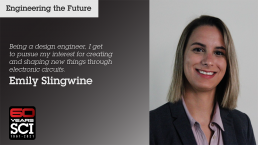
Emily Slingwine
Electronic Design Engineer
Years at SCI: 6 months
College: University of Nebraska, Lincoln
Why did you go into engineering?
I chose engineering because I was excited by the chance to shape the future and meet the world’s problems head on.
What was your first engineering project?
My first project at SCI was helping to test the FireComm system for CH-53K
What is/was your favorite project (past or present)?
My favorite project was designing and building a prototype of a vehicle to aid police in data collection at the scene of a car accident
How does your current job relate to your interest in engineering?
Being a design engineer, I get to pursue my interest for creating and shaping new things through electronic circuits.
Why did you choose SCI?
I entered the job market in the middle of a pandemic so seeing SCI continue move forward at this time gave me confidence this was the right place to start my career
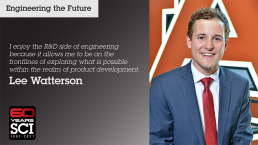
Lee Watterson
Mechanical Design Engineer
Years at SCI: 2
College: Auburn University
Why did you go into engineering?
I was fortunate enough to cut my teeth in the mechanical engineering field early on by working with a professional sports car racing team through high school and college. This role let me peek inside the world of engineering and I immediately knew that I wanted to be a part of it.
What was your first engineering project?
The project that I would say moved me from “messing around” to “engineering” for the first time was replacing the powertrain of a Porsche 944 race car to improve on-track performance. I was a high school student and had no official technical education that explained why things worked the way they did. However, I was given the tools to succeed and constructively pushed into the world of trial-by-fire by a mentor. I feel that this is one of the most valuable experiences I was able to have early in my career.
Do you recall any particularly memorable or unusual event in your career?
While in college, two friends of mine and I were given the opportunity to build a shaved ice food truck to be used on campus at The University of Alabama. The school wanted to use this to showcase students’ professional endeavors outside of the classroom. We designed and built this food truck from the frame-up. Looking back on it, this was one of the most unique and rewarding projects I have been a part of.
What is/was your favorite engineering project?
My favorite project would have to be my current project, SCI’s AeroGuard. I think the concept of capturing a drone with another drone is inherently interesting. However, that idea coupled with a working environment that demands creative thinking and out-of-the-box solutions lands this project as my favorite.
What is your job at SCI?
I am a Mechanical Design Engineer in the Technology Segment at SCI. My primary role in our group is to design, prototype, and test components and subsystems to be used in the development of SCI’s AeroGuard.
How does your current job relate to your interest in engineering?
I enjoy the R&D side of engineering because it allows me to be on the frontlines of exploring what is possible within the realm of product development. As a result, I believe my current job is pretty much my ideal working environment. The whole counter-drone industry is brand-new so being able to work in virtually any direction and finding myself in uncharted territory is extremely exciting and engaging to me.
Why did you choose SCI?
The leading reason why I chose SCI was so that I could be a part of a company that does meaningful work by offering creative solutions. With SCI’s broad product line, I feel that I have the opportunity to grow in my career and gain varying experiences and knowledge at an expedited rate.
